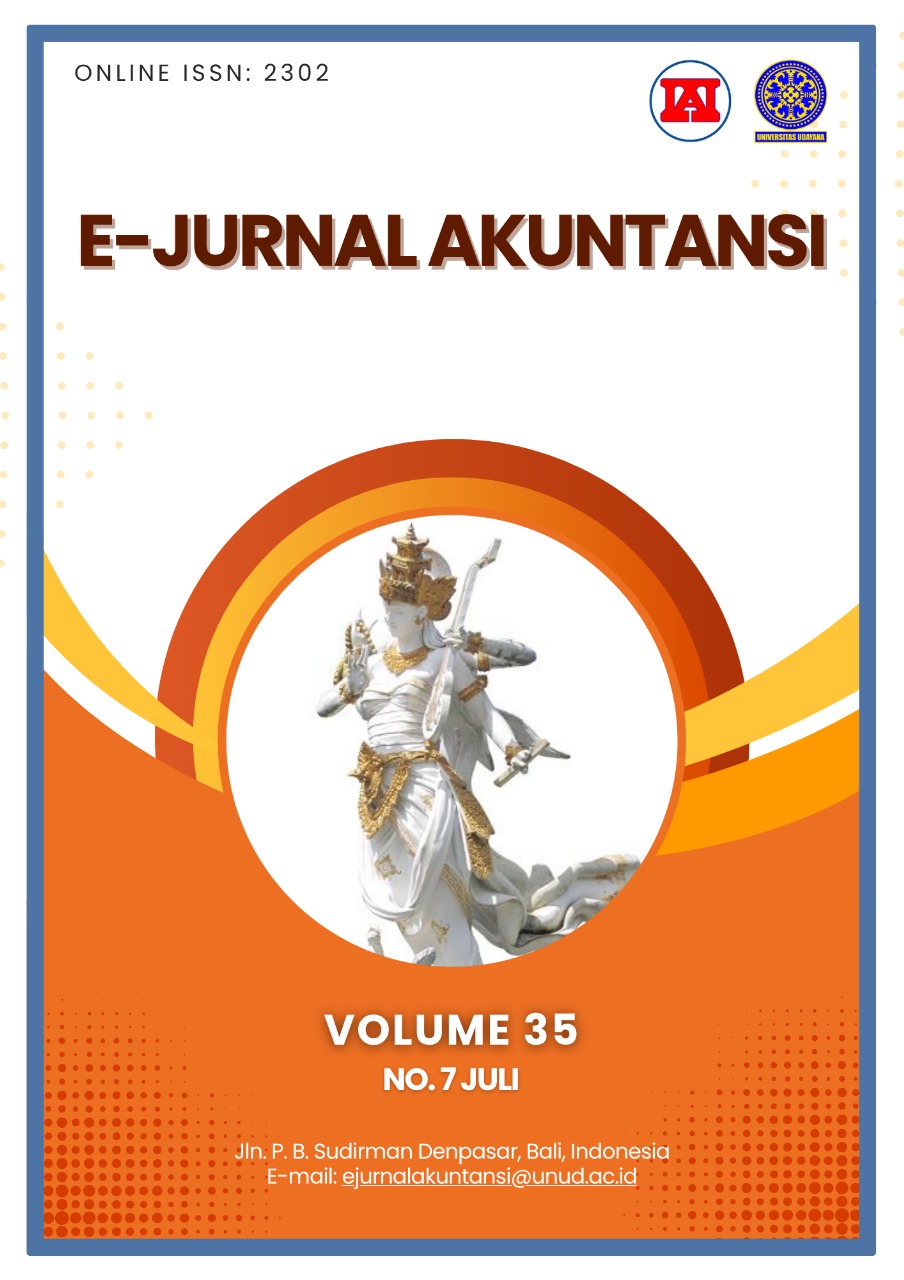Evaluation of Environment, Social, and Governance (ESG) Implementation at PT XYZ
Abstract
Sustainability issues have encouraged companies to integrate Environmental, Social, and Governance (ESG) principles into their business strategies, including in the banking sector. This study aims to evaluate ESG implementation at PT XYZ from a management perspective that includes perceived benefits, strategies and initiatives, as well as challenges and outlook. The study used a single case study qualitative approach with semi-structured interview techniques to nine informants who have direct responsibility for ESG implementation. Data were analyzed thematically and strengthened by stakeholder and legitimacy theories. The results show that ESG implementation has provided real benefits, especially in social and governance aspects, such as improved reputation, customer loyalty, and transparency. However, the contribution of environmental aspects is still limited and ESG impact measurement is not yet systematic. The main challenges come from internal coordination, limited resources, and regulatory uncertainty. PT XYZ is considered to need to strengthen its ESG organizational structure, improve cross-functional training, and adopt a digital system for sustainability reporting. This study provides practical insights for other financial institutions that are pioneering ESG integration and enriches understanding of ESG as a strategy for legitimacy and stakeholder engagement.
Keywords: Environmental, Social, and Governance (ESG); Management Perspective; Perceived Benefits; Challenges and Obstacles to ESG Implementation
Downloads
References
Chandon, P., Wansink, B., & Laurent, G. (2000). A benefit congruency framework of sales promotion effectiveness. Journal of Marketing, 64(4), 65–81.
Chandra, B. A., & Shauki, E. R. (2024). Evaluasi Pengungkapan Laporan Keberlanjutan Berdasarkan GRI Framework Pada PT. Bank Syariah Indonesia. Owner: Riset Dan Jurnal Akuntansi, 8(2), 1786–1796.
Fajri, A., Izzati, A. K., & Munandar, A. (2021). Pengukuran Pengungkapan Sustainability Reporting Himpunan Bank Negara (Himbara). Jurnal Ilmiah Akuntansi Dan Keuangan, 4(01), 27–39.
Freeman, R. E., & Reed, D. L. (1983). Stockholders and stakeholders: A new perspective on corporate governance. California Management Review, 25(3), 88–106.
Gustafsson, J. (2017). Single case studies vs. multiple case studies: A comparative study.
Gutiérrez-Ponce, H., & Wibowo, S. A. (2023). Do sustainability activities affect the financial performance of banks? The case of Indonesian Banks. Sustainability, 15(8), 6892.
Haislip, J. Z. (2025). Environmental, Social, and Governance Committees and Information Technology Outcomes. Journal of Information Systems, 39(1), 1–24. https://doi.org/10.2308/ISYS-2024-050
Kumar, A., King, T., & Ranta, M. (2024). Corporate governance characteristics and involvement in ESG activities: current trends and research directions. Corporate Governance (Bingley), 24(8), 175–209. https://doi.org/10.1108/CG-09-2023-0397
Lavorato, D., Piedepalumbo, P., & Lamboglia, R. (2025). Role of Information Systems in Controlling and Monitoring ESG Performance: Evidence from an Empirical Study. In SIDREA Series in Accounting and Business Administration: Vol. Part F213 (pp. 621–638). https://doi.org/10.1007/978-3-031-76618-3_29
Pangaribuan, C. M. P., & Idrianita, I. (2024). Analisis Praktik Esg Bank First Mover on Sustainable Finance. AKADEMIK: Jurnal Mahasiswa Ekonomi & Bisnis, 4(3), 1392–1406.
PT XYZ. (2023). Laporan Keberlanjutan 2023.
Rohinun. (2024). Menilik Konsep Keberlanjutan: Urgensi Menyeimbangan Aspek Lingkungan, Sosial & Ekonomi. Sparse FEB UGM. https://sparse.feb.ugm.ac.id/menilik-konsep-keberlanjutan-urgensi-menyeimbangan-aspek-lingkungan-sosial-ekonomi/
Rohman, H. A. N., Ainiyah, N., & Ilmidaviq, M. B. (2024). Pengaruh Environmental, Social, and Governance (ESG) terhadap Financial Performance: Peran Struktur Kepemilikan sebagai Variabel Pemoderasi. Jurnal Ilmiah Ekonomi, Akuntansi, Dan Pajak, 1(3), 265–280.
Rozali, Y. A. (2022). Penggunaan analisis konten dan analisis tematik. Penggunaan Analisis Konten Dan Analisis Tematik Forum Ilmiah, 19, 68.
Safiudin, M. I., & Ningtyas, H. I. R. N. (2024). PENGARUH PENERAPAN ENVIRONMENTAL, SOCIAL, DAN GOVERNANCE TERHADAP PROFITABILITAS PADA PERUSAHAAN DI INDONESIA (Studi Pada Perusahaan Manufaktur Yang Terdaftar Di PROPER Periode 2018-2022). Transparan, 16(2), 74–84.
Sakti, A. D. (2024). Penerapan ESG di Indonesia: Tantangan dan Harapan (2024). Indonesia Environment & Energy Center. https://environment-indonesia.com/penerapan-esg-di-indonesia-tantangan-dan-harapan-2024/
Setiawati, A., & Hidayat, T. (2023). The Influence Of Environmental, Social, Governance (ESG) Disclosures On Financial Performance. Jurnal Ekonomi, Manajemen Dan Perbankan (Journal of Economics, Management and Banking), 9(3), 225–240. https://doi.org/10.35384/jemp.v9i3.454
Sharma, M., & Choubey, A. (2022). Green banking initiatives: a qualitative study on Indian banking sector. Environment, Development and Sustainability, 24(1), 293–319.
Suchman, M. C. (1995). Managing legitimacy: Strategic and institutional approaches. Academy of Management Review, 20(3), 571–610.
Sulung, U., & Muspawi, M. (2024). Memahami sumber data penelitian: Primer, sekunder, dan tersier. Edu Research, 5(3), 110–116.
Wolfson, N., Kraiger, K., & Finkelstein, L. (2011). The Relationship between Diversity Climate Perceptions and Workplace Attitudes. Psychologist-Manager Journal, 14(3), 161–176. https://doi.org/10.1080/10887156.2011.546170
Yona, S. (2006). Penyusunan studi kasus. Jurnal Keperawatan Indonesia, 10(2), 76–80.

This work is licensed under a Creative Commons Attribution-ShareAlike 4.0 International License.

















